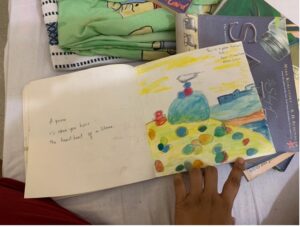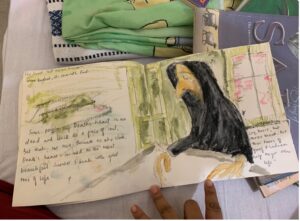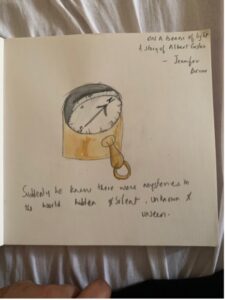Pause Library: A space to nurture hope and agency
 This post reflects on questions such as: What is the role of libraries in a mental health space? What value do picture books have in the life of an adult? What is the hope from Pause extending its space for books?
This post reflects on questions such as: What is the role of libraries in a mental health space? What value do picture books have in the life of an adult? What is the hope from Pause extending its space for books?
A Constant State of Ache
My heart constantly aches at the plight of the world. As a psychotherapist, I strive to make visible the ways we respond with protest, resistance, and agency (White, 2007). Listening to stories of oppression and privilege daily creates an unshakable ache. Holding space for my oppressions and privileges has become a staple, and sometimes, finding hope seems nearly impossible. Yet, a slow movement towards an alternate discourse filled with everyday hope keeps me going.
The Hope of the Pause Library
Pause Library serves as a sanctuary for hope. The hope is that as people of all ages walk into this space, filled with a diverse collection of over 1,000 books, they feel welcome to process grief, connect with hope, and embrace a beginner’s mind. Seeing books stacked next to each other brings a non-verbal healing process. Reading these books may provide a language for aching hearts, embodying color and joy within. Our library’s environment strives to nurture this transformation, fostering a sense of calm and connection through its carefully curated collection.
When I first visited libraries like ours, something non-verbal within me began to start working itself into process. I began to ‘read’ the space around me by drawing what was drawing me in.
The illustrations, the stories, and the simple act of turning pages and stumbling upon an inner quietness manifested in sitting and reading these books. A certain language for my achy heart, some color, some joy was embodying itself within. Along with it, of course, the depth of this work of being a library educator began to unfold.
Acknowledging the Reader Within Us All
There is a reader in all of us, and the potential of reading is inherent. Our bodies often understand before our rational minds. Childhood stories, told by significant people, influence us profoundly. These narratives, and the people and places associated with them, shape our sense of self and our worldview. As a therapist, I celebrate this agency. Libraries, like Pause Library, offer a respite from single stories and nurture our sense of self, allowing us to explore diverse perspectives and connect with who we are.
Nurturing Agency in Libraries
Books chosen with sensitivity to people’s identities can help develop a just world from a young age. For instance, books like “Bully” by Patricia Polacco or “A Boy in the Cupboard” by Harshal Gupte and Priya Dali can support group sessions on bullying or gender, helping children cope with their crises.
Library: A Growing Organism
The idea of a library as a growing organism excites me. At Pause for Perspective, we have established a full-fledged library with over 1,000 books. We regularly lead sessions where people of all ages gather to read and discuss mental health and their experiences. This growing organism of a library brings hope, allowing everyone to find inner quietness through stories and illustrations. The library’s evolution, with its expanding collection and diverse programs, embodies the dynamic and ever-changing nature of a living space.
“Hope is the thing with feathers” (Dickinson, 314). Written words support our voice, lifting us in life’s painful grappling and restoring safety and hope. Witnessing books standing shoulder to shoulder with our questioning hearts brings the sweetest tune of hope. I aim to nurture libraries in therapy and mental health spaces, integrating books into my work to support conversations with children, clients, and the mental health community.
Integrating Mental Health and Libraries
I once had a student ask me how to navigate the overwhelm of witnessing pain from marginalized voices during a conversation about casteism. They asked how to take care of oneself while staying present to the world’s atrocities. I read “Jamlo Walks” by Samina Mishra and Tariq Aziz to the class, emphasizing that escaping pain is impossible. Emotions can’t be shunned, and our pain protests against inequity. Spaces like Pause Library offer solace, nurturing our capacity to hold space through books and libraries.
In conclusion, my journey as a library educator has taught me to acknowledge the reader within us all, nurture agency in libraries, and integrate mental health and literature. These spaces can offer hope, safety, and a deeper connection with ourselves and the world around us.


